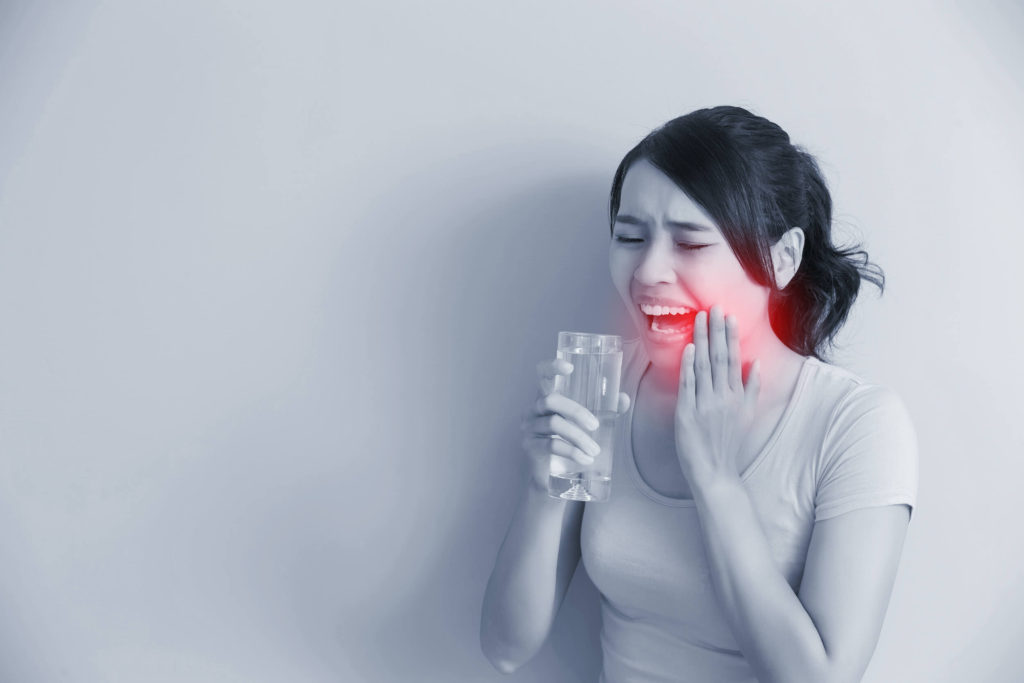By Dr. Yvette Porter
Tooth sensitivity happens when the enamel protecting your teeth gets thinner. It can also happen when gum recession occurs, exposing the dentin. This reduces the protection the gums and enamel provide to your teeth and their roots. About half the population suffers from tooth sensitivity.
WHY DOES TOOTH SENSITIVITY HAPPEN?
Once the root of your tooth becomes exposed, it will only have a soft covering known as cementum. And when this soft covering is lost, it leaves the dentin of the root exposed. The abrasion of your tooth enamel can be caused by abrasive toothpaste or overzealous brushing. An acidic diet can also cause tooth erosion.
Exposed dentin is painful because it has thousands of tiny channels containing fluid that can only be seen through a microscope. This fluid moves after drinking or eating cold or hot foods, thus irritating the nerves in the affected tooth and causing pain.
If you have sensitive teeth, it can be painful to brush them. Brushing poorly because of pain will put you at risk of gum disease and tooth decay. Bear in mind that pain after consuming cold, hot or acidic foods can also be a sign of a hole in your affected tooth.
When this happens, it is crucial for you to inform your dentist about it. Having the best dentist to examine your teeth and help you select the required treatment for your problem is in this case, necessary.
 7 THINGS TO DO IF YOU HAVE SENSITIVE TEETH
7 THINGS TO DO IF YOU HAVE SENSITIVE TEETH
1. Talk to your dentist
Communicating with your dentist is the initial step in finding relief from tooth sensitivity. Describe your symptoms and inform your dentist when you start feeling the pain. Once your dentist has determined the reason for your discomfort, the underlying cause can be treated. Treatment may include replacing a worn filling or fixing a cavity. But if your discomfort is caused by gum recession, a gum graft may be the best solution to protect the surface of the affected root and support your tooth.
2. Use toothpaste made specifically for sensitive teeth
There are different brands of toothpaste that are made specifically for people suffering from sensitive teeth. Some may contain potassium nitrate that helps block the tiny tubules in the dentin.
Though these products don’t work for everyone, dental experts agree that this is the best place to start.
3. Avoid acidic food and beverages
Consuming fruit juices, red wine, and acidic food like pickles and oranges can put your enamel at risk for erosion. Limit your consumption of these foods and make sure to brush about 20 minutes after eating them.
Brushing immediately after will hurt your enamel further. Even when you don’t have sensitive teeth, you should always be meticulous about what you eat because enamel loss is irreversible.
4. Brush properly
If you are scrubbing your teeth forcefully or brushing for less than two minutes, and if you are not using a soft brush, then you are not taking good care of your sensitive teeth.
Vigorous brushing willwear away your enamel and this will increase the sensitivity in your teeth. So changing your brushing habit is also extremely important.
5. Stop grinding your teeth
Teeth grinding can wear away enamel, resulting in tooth sensitivity. So if you know you are grinding your teeth while you are asleep, use a custom-fitted mouthguard. If you often find yourself grinding your teeth when you are tense, always remind yourself to be calm and relax your jaws.
6. Apply desensitizing products
Desensitizing products like plastic resin can be applied by your dentist to the sensitive areas of your teeth. This product helps strengthen your tooth enamel as well as reduce painful sensations. However, remember that it wears away over time so it needs to be reapplied periodically.
7. Treat your receding gums
The root of your affected tooth is covered by gum tissue. With gum recession due to hard brushing or gum disease, the roots will become exposed and the cementum can wear away.
Good thing your dentist can help restore or rebuild your receding gums. A treatment that involves tissue grafts may be your best choice.
Sensitive teeth aren’t just painful because they can also interfere with your day-to-day life. Good thing there are ways to reduce and relieve tooth sensitivity. Let your dentist in on your situation as he is the best person who can assess your case and recommend the best solution.
ABOUT THE AUTHOR:
 Dr. Yvette Porter is the founding dentist at Apple Dental in Newstead, Brisbane, which she started over 11 years ago, and continues to own and practice there today. She works with a team of female dentists who aim to provide gentle, and affordable dental care to patients in Brisbane. Dr. Porter is a member of the Australian Dental Association and is passionate about family, and children’s dentistry, hoping to make their dental experience truly pleasant.
Dr. Yvette Porter is the founding dentist at Apple Dental in Newstead, Brisbane, which she started over 11 years ago, and continues to own and practice there today. She works with a team of female dentists who aim to provide gentle, and affordable dental care to patients in Brisbane. Dr. Porter is a member of the Australian Dental Association and is passionate about family, and children’s dentistry, hoping to make their dental experience truly pleasant.



